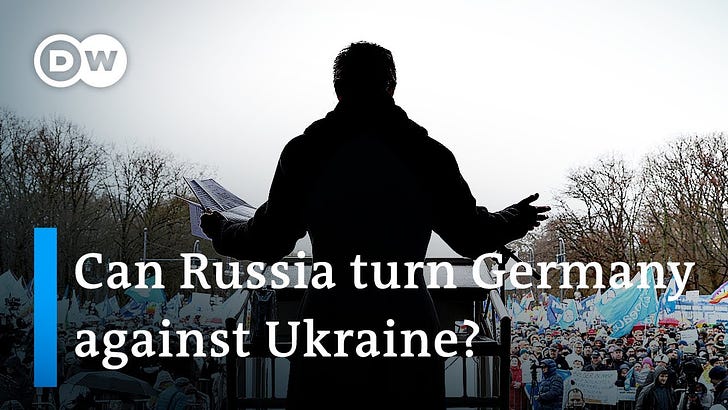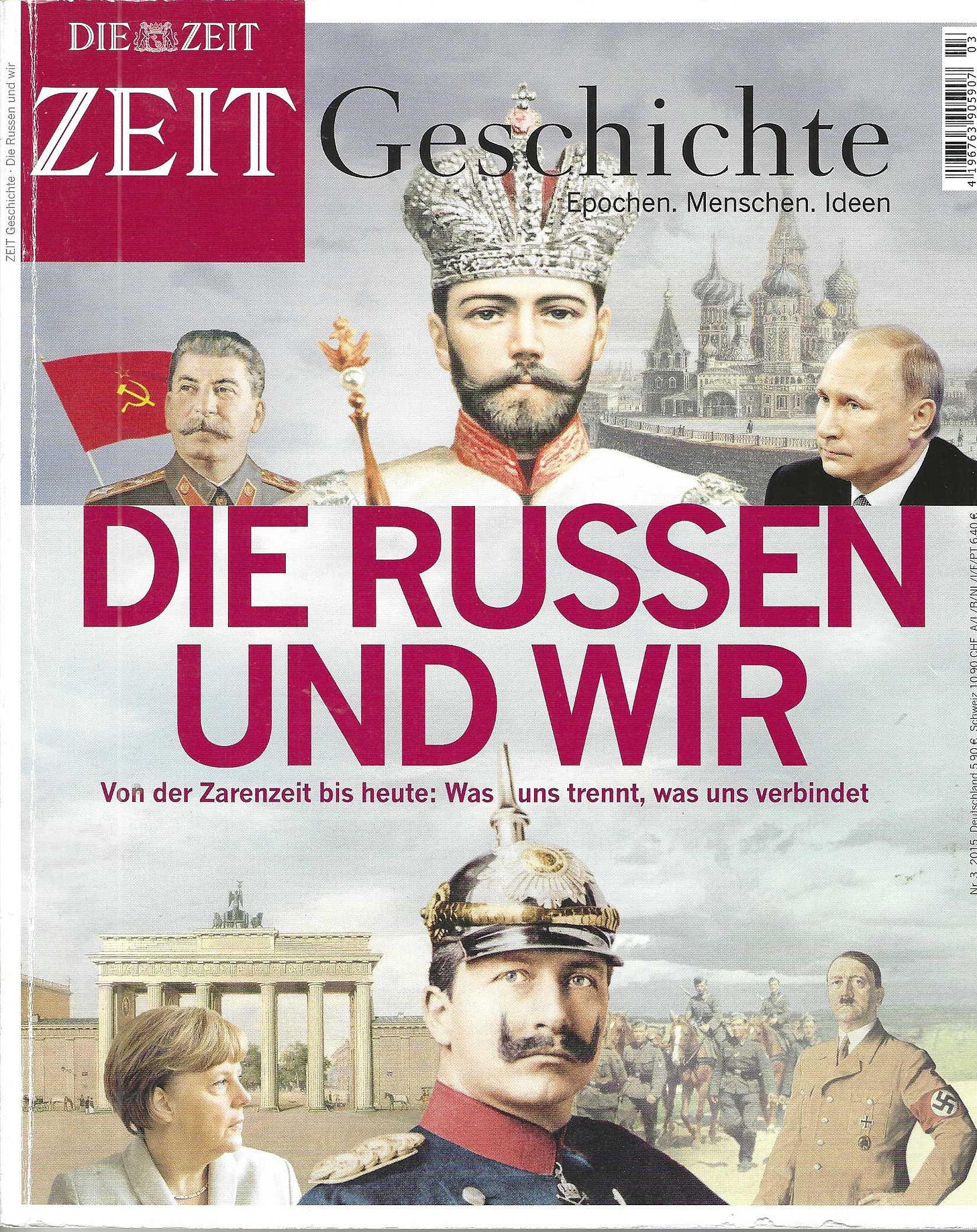Left-right alliance in Germany against Western support of Ukraine?
Also, Reichsbürgers not recommended!
The Washington Post just published an article on attempted Russian influence on German politics that provides a good example of how readers need to approach such articles1. The story is about Russian efforts to encourage antiwar activism by two factions in German politics: the far-right Alternative for German (AfD) and left-leaning voters previously attached to Die Linke, the Left Party.
I generally go on the assumption that all news reports require critical reading.
In this case, the bylined reporters include Shane Harris, an experienced intelligence reporter, and Catherine Belton, author of Putin’s People (2020) who has written on Putin’s government in depth. The third is a German journalist, Souad Mekhennet, who has reported for the German TV channel ZDF and the Frankfurter Allgemeine Zeitung. So they have a solid background for this kind of reporting.
Deutsche Welle also carried the story, with Belton included:
One of the key figures in the report here is Sahra Wagenknecht, a longtime leader in the Left Party since its original incarnation as the “post-communist” Party of Democratic Socialism (PDS), successor party to the East German Communist Party, that was formally called the Socialist Unity Party (SED). She positioned herself initially within the PDS as an advocate for a version of orthodox Marxism-Leninism, but morphed her political identify if various ways over the decades. As politicians are inclined to do.
Most recently she’s landed on opposition to Western assistance to Ukraine during the current war and on promoting xenophobia against refugees and immigrants. Somewhere along the way she flirted with the conservative “ordoliberalism” that has been very influential among German conservatives. She’s currently talking about starting a new party.
While the Left Party has made some inroads in the former West Germany including Berlin, it still has its stronghold in states of the former East Germany. Even in the post-USSR world, the party maintained some friendly relationships to Russian potiical groups. And part of their constituency in eastern Germany maintained a more positive attitude toward Russia than was common among other Germans.
A longer view of Germany and Russia
But Germany and Russia have a long, complicated relationship (to put it mildly). That was the theme of his 2015 edition of ZEIT Geschichte, title “The Russians and Us.”2
Russia and Germany were enemies during the First and Second World Wars. But in between, they cooperated as “outsider” nations for mutual support in military affairs in particular under the 1922 Treaty of Rapallo3. And, more notoriously, in the German-Soviet Nonaggression Pact of 1939.4
During the Cold War, Germany’s Ostpolitik (eastern policy) was important in easing tensions with the Soviet Union over the years and promoted dialogue, interaction, and commerce with East Germany and other Warsaw Pact countries. In the post-Cold War years, Germany expanded economic ties with Russia, notably with the Nord Stream pipeline projects, and tried to integrate Russia into a larger European security system. Germany and France were also far more cautious about expanding NATO eastward, especially on the rash 2008 formal promise to incorporate Georgia and Ukraine but without beginning the formal accession process.
Russia cultivated ties with European politicians, very notably including former Social Democratic Chancellor Gerhard Schröder.5
The spectrum of political influence by foreign powers
The issue of political parties and groups being influenced in some way by foreign governments is both touchy and often very complicated.
The former Soviet Union was lead by the Soviet Communist Party, which in various forms maintained formal ties with Communist parties in other countries that viewed the Soviet party as the leader of a world revolutionary movement. We can see some echo of that structural arrangement in formal ties that Putin’s Russia United Party established with some EU political parties, including Marine Le Pen’s National Rally party in France, the Lega in Italy, and the Freedom Party (FPÖ) in Austria.
And, of course, there is the sticky issue of Russian disinformation and attempts to interfere in elections, e.g., the famous “Russiagate” controversy around the 2016 Presidential election.
I try to keep in mind a few general perspectives:
All foreign policy involves agreeing and disagreeing with positions other governments take.
Political and intellectual influences obviously cross national borders. And it’s been that way for a long time. No one in the US thinks much about listening sympathetically to opinions of parties from friendly countries like Britain, Australia, Canada, or Israel.
Friendly interchanges and formal relationships between parties from different countries is nothing new, and it not confined to the left or right edges of the political spectrum. Political parties in the EU countries, for instance, join together in formal European-wide parties in their EU Parliamentary roles.6
Some interactions between governments and foreign nationals, including political parties and groups, are illegal. Other may be dubious but legal. Others may be dishonest and/or openly despicable but legal. Others may be formal but not especially influential, e.g., the Socialist International of social-democratic parties.
It’s a typical diplomatic practice for national embassies to have formal meetings and communications with political parties in their host countries. Obviously, this is more common between countries with generally friendly relationships.
Attempting political influence is not the same as stealing national security secrets. Some versions of the former may be illegal. But money or blackmail is more likely to be the focus in the latter, though ideological leanings could factor in, too.
The Wagenknecht-AfD story
The core of the Washington Post story seems to be this:
The documents record meetings between Kremlin officials and Russian political strategists, and the Kremlin’s orders for the strategists to focus on Germany to build antiwar sentiment in Europe and dampen support for Ukraine. The files also chronicle the strategists’ efforts to implement these plans and their reports back to the Kremlin. The documents do not contain any material that records communications between the Russian strategists and any allies in Germany. But interviews show that at least one person close to Wagenknecht and several AfD members were in contact with Russian officials at the time the plans were being drawn up. [my emphasis]
The Post also notes, “Moscow has long cultivated dozens of AfD members, especially through lavish, all-expenses-paid trips to Russia, documents and interviews show.“
And its description of the activities of Wagenknecht’s ex-husband Ralph Niemeyer does make it sound like he may be pushing the edges of legality on some of his activities. His “house was raided in late March as part of a criminal investigation over his alleged involvement in a plot by the ultra-right Reichsbürger movement to overthrow the German government — allegations that Niemeyer denies.” The Reichsbürgers’ ideology is similar to that of the US far-right “sovereign citizens” movement.
The Post also reports:
AfD members and Niemeyer have continued to travel to Russia since the war began. When Niemeyer traveled to Vladivostok, a Russian city in the Far East, in September, he posted images on social media of his meetings at an economic forum with Peskov, Foreign Minister Sergei Lavrov and Alexei Miller, chief executive of Gazprom, the Russian state gas giant.
Niemeyer said at the time that he was there to negotiate a new gas supply contract through Nord Stream 2 with Moscow, on behalf of what he called “a German government in exile.”
Negotiations on behalf of a non-existent “German government in exile”?!?
This is not the kind of guy whose weekly Stammtisch group you want to be hanging around!
Summary
Yes, the AfD and other far-right parties in Europe tend to look to Hungary’s Viktor Orbán and Russia’s Vladimir Putin as models for governance and political agitation. The “conservative movement” of American Trumpistas are particularly fond of Orbán at the moment.
In other words, these alignments are important to watch.
It’s also important not to read into them implications that aren’t yet clearly in evidence.
Also: Don’t hang out with Reichsbürgers!!
Belton, Catherine & Mekhennet, Souad & Harris, Shane (2023): Kremlin tries to build antiwar coalition in Germany, documents show. Washington Post 04/21/20023, <https://www.washingtonpost.com/world/2023/04/21/germany-russia-interference-afd-wagenknecht/> (Accessed: 04/22/2023).
Die Russen und Wir. ZEIT Geschichte 3:2015.
Vor 100 Jahren: Unterzeichnung des Vertrags von Rapallo. Bundeszentrale für politische Bildung 08.04.2022. <https://www.bpb.de/kurz-knapp/hintergrund-aktuell/507112/vor-100-jahren-unterzeichnung-des-vertrags-von-rapallo/> (Accessed: 04/22/2023).
Editors (2023): German-Soviet Nonaggression Pact. Britannica Online 03/22/2023. <https://www.britannica.com/event/German-Soviet-Nonaggression-Pact> (Accessed: 04/22/2023).
Preussen, Wilhelmine (2023): Putin’s pal Gerhard Schröder won’t be kicked out of Germany’s Social Democrats. Politico EU 03/02/2023. <https://www.politico.eu/article/gerhard-schroder-remain-party-member-germany-social-democrats-vladimir-putin/> (Accessed: 04/22/2023).
The Political groups of the European Parliament.About Parliament-European Parliament website. <https://www.europarl.europa.eu/about-parliament/en/organisation-and-rules/organisation/political-groups> (Accessed: 04/22/2023).



